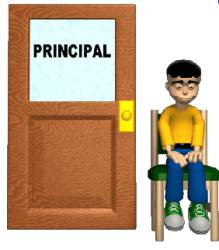High School Committee to Examine the Code of Conduct
- Category: Schools
- Published: Thursday, 28 October 2010 08:22
- Joanne Wallenstein
 In an October 25 email to the community, SHS Principal John Klemme announced that he has invited a group of teachers, coaches, team captains, government officers, parent and administrators to review the school’s Standards for Extracurricular Participation which are incorporated into the school's Code of Conduct. The current "Standards" governs student conduct both on and off campus and was recently called into question when students refused to provide information to the school about an off-campus altercation. As currently written, it specifies that in order to participate in a team sport at SHS, students must display academic integrity, abstain from substance abuse, and respect their community. There are consequences for infractions, and a Fairness Committee in concert with the Principal rules on these cases.
In an October 25 email to the community, SHS Principal John Klemme announced that he has invited a group of teachers, coaches, team captains, government officers, parent and administrators to review the school’s Standards for Extracurricular Participation which are incorporated into the school's Code of Conduct. The current "Standards" governs student conduct both on and off campus and was recently called into question when students refused to provide information to the school about an off-campus altercation. As currently written, it specifies that in order to participate in a team sport at SHS, students must display academic integrity, abstain from substance abuse, and respect their community. There are consequences for infractions, and a Fairness Committee in concert with the Principal rules on these cases.
However, when students refuse to provide information on misconduct that has occurred off school grounds, it is difficult to enforce the Code. Recent events have challenged the efficacy of the Code and Klemme is leading a team to re-examine it to see if the school should hold students accountable for misbehavior off campus.
Discussing the event at a School Board meeting Superintendant of Schools Michael McGill said that he believed that parents want students to know that misdeeds will have meaningful consequences yet these consequences need to be reasonable, in proportion to the offense and not have life-changing ramifications.
So how can the school dictate good behavior in the absence of cooperation from students and parents? We spoke to a few parents with children in the high school and here are their views on the Code of Conduct.
One mom said, “a student’s code of ethics should be consistent, on and off the field, at school or at a party and there should be consequences when kids cross the line. It’s a learning experience.”
When asked if the Code should extend to off-campus activities another said, “While I favor the effort to try to moderate and control dangerous and illicit behavior such as underage drinking through any reasonable means, it is unrealistic to think that the regulatory purview of the school can extend to non-school hours and events, not the least because reports of bad behavior are automatically hearsay since presumably no member of the school administration would have been present to witness the transgression. Students who are determined to engage in this type of behavior are presumably not deterred by the Code. Those who were tempted but fearful of consequences and therefore refrain might feel less constrained if the Code no longer applies to non-school activities. I really think it depends on the individual student and his or her own sense of acceptable and ethical behavior.”
A third mom said, “I don’t think the school can or should try to control what happens when school is not in session or at off campus events. It is very hard to prove what happens and there is a code of silence that prevents incidents from being reported. Ultimately it is up to the parents to instill morals in their children."
Another said, “I feel strongly that the code should only apply to events on campus or where students are CLEARLY representing Scarsdale High School, like attendance at the Model UN or track meets or football games. I believe the code is not entirely enforceable for off-campus events such as the Labor Day incident. The question is whether or not (the Code) is consistently enforced. I think many believe that there is no consistency, much like the curriculum. But that is another issue.”
The committee will have many questions to examine. If they agree that the Code should not apply off campus, will it be in force for school excursions such as debate tournaments, language exchanges and chorus trips? What about online offenders who harass classmates via the Internet, email and text messaging?
It is difficult to predict how a change in the Code would affect student behavior. If the school does decide that incidents off school grounds have no ramifications in school, police and parents will be left to handle teen fights, drinking and drug abuse. Without the potential to be benched from a game or suspended, will student behavior get worse? If the school steps out, will police be harder on the kids since they know that the school will not exact any consequences? It will be interesting to learn the outcome of the committee’s discussions as they examine the school’s role in promoting good behavior.
We welcome your thoughts in the comments section below:







